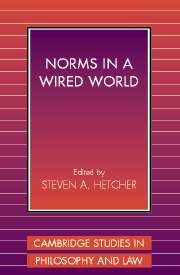Book contents
- Frontmatter
- Contents
- Acknowledgments
- Introduction
- PART I THE PATTERN CONCEPTION OF NORMS
- PART II NEGLIGENT NORMS
- 6 The Traditional Rule of Custom
- 7 The Evidentiary Rule of Custom
- 8 A World of Dangerous Norms and Customs
- 9 Regulating the Rule of Custom to Create Safe Social Norms
- 10 Juror Norms and the Reasonable Person Standard
- 11 Rejection of the Dominant Paradigm of Negligence
- PART III CYBERSPACE PRIVACY NORMS
- Conclusion
- Notes
- Index
7 - The Evidentiary Rule of Custom
Published online by Cambridge University Press: 05 June 2012
- Frontmatter
- Contents
- Acknowledgments
- Introduction
- PART I THE PATTERN CONCEPTION OF NORMS
- PART II NEGLIGENT NORMS
- 6 The Traditional Rule of Custom
- 7 The Evidentiary Rule of Custom
- 8 A World of Dangerous Norms and Customs
- 9 Regulating the Rule of Custom to Create Safe Social Norms
- 10 Juror Norms and the Reasonable Person Standard
- 11 Rejection of the Dominant Paradigm of Negligence
- PART III CYBERSPACE PRIVACY NORMS
- Conclusion
- Notes
- Index
Summary
If the defendants had proved that in every mining establishment that has existed since the days of Tubal-Cain, it has been the practice to cut ladder-holes in their platforms, situated as this was while in daily use for mining operations, without guarding or lighting them, and without notice to contractors or workmen, it would have no tendency to show that the act was consistent with ordinary prudence, or a due regard for the safety of those who were using their premises by their invitation. The gross carelessness of the act appears conclusively upon its recital.
Mayhew v. Sullivan Mining Co.Introduction
This chapter continues the examination of the role that social norms and customs play in tort law. The last chapter concluded with an examination of how customary easements have arisen in situations that might otherwise constitute a trespass, owing to the recognition of community norms of land use. The present chapter extends the analysis beyond the specific context of trespass to tort law generally. Custom's role in tort is pervasive. When people injure one another while conforming to social norms and customs, it is the duty of tort law to determine which of these injuries may merit legal redress.
Modern tort law mainly follows the negligence standard according to which one will be found liable for an injury only if one acted negligently in causing it. Leading early cases established the connection between negligence and “ordinary care” While ordinary care and due care are often used as synonymous terms in tort law, note the linguistic peculiarity of referring to ordinary care in a circumstance in which there is a lack of relevant customary activity.
- Type
- Chapter
- Information
- Norms in a Wired World , pp. 163 - 177Publisher: Cambridge University PressPrint publication year: 2004

